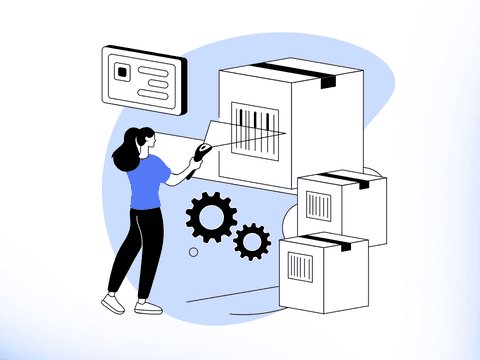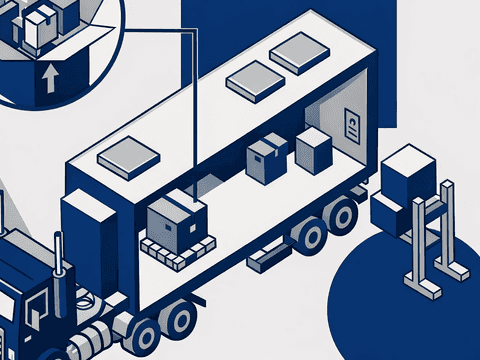TL,DR:
- Bringing every channel into a single platform allws your agents to deliver better customer service in eCommerce
- Choosing the best eCommerce customer service software is tough: there are many contenders, and only a few truly serve D2C brands
- Follow these best practices: sync live order data for agents, send proactive updates, route tickets by specialty, and automate shipping incidents and FAQs
- Outvio Desk is the only reliable platform that lets you unite orders, channels, and carriers, automate your post-purchase processes, and boasts a 4.8 rating on G2
84% of online customers consider customer service an essential purchasing value. Improving and optimizing support service will help you not only improve conversion rates but also reduce logistics and shipping costs.
However, choosing eCommerce customer service software is complicated. Firstly, because there is a great variety, and secondly, because not all support patforms are truly specialized in d2c.
This guide spotlights the top integrated eCommerce customer service tools, compares the most reliable online platforms, and shares field-tested best practices for turning support into profit in 2026.
Comparison of the best e-commerce customer service automation tools
| Software | G2 Rating ⭐ | Entry-level Price* | Best for |
|---|---|---|---|
| Outvio Desk | 4.8 ⭐⭐⭐⭐⭐ | Module-based | Full support & post-purchase automation |
| Minami | 5.0 ⭐⭐⭐⭐⭐ | Custom Pricing | AI Agent for eCommerce |
| Shared Inbox by Canary | 5.0 ⭐⭐⭐⭐⭐ | $10/user per month | AI-Powered Shared Inbox |
| Hiver | 4.6 ⭐⭐⭐⭐⭐ | US $24 / agent / mo | Shared inbox for Gmail |
| Freshdesk | 4.4 ⭐⭐⭐⭐☆ | US $18 / agent / mo | Multichannel ticketing system |
| Zoho Desk | 4.4 ⭐⭐⭐⭐☆ | US $9 / agent / mo | Omnichannel (phone, email, SMS) |
| Gorgias | 4.6 ⭐⭐⭐⭐⭐ | US $174 / mo (300 tickets) | E-commerce help desk (Shopify, etc.) |
| Zendesk | 4.3 ⭐⭐⭐⭐☆ | US $69 / agent / mo | B2B customer-service suite |
| LiveAgent | 4.5 ⭐⭐⭐⭐⭐ | US $15 / agent / mo | Real-time chat & omnichannel |
| eDesk | 3.9 ⭐⭐⭐⭐☆ | US $49 / agent / mo | Tickets linked to marketplace orders |
| HappyFox | 4.5 ⭐⭐⭐⭐⭐ | US $29 / agent / mo | Customizable knowledge bases |
| Help Scout | 4.4 ⭐⭐⭐⭐☆ | US $55 / mo (up to 100 contacts) | Personalized email & live chat |
What is integrated customer service software in eCommerce?
Integrated eCommerce customer support software brings email, live chat, social media, and phone interactions into one omnichannel dashboard with real-time order and return tracking. With this tool, agents open a single, tidy workspace where every email, chat, tweet, and phone note from a shopper sits beside up-to-the-minute order details. Smart automation handles routine questions, freeing the team to resolve complex issues and recommend products customers will love.
When integrating an eCommerce support platform
If your eCommerce business is handling an increasing volume of customer inquiries, especially across different channels, it may be time to integrate customer support software. Managing all these interactions manually can slow response times, reduce customer satisfaction, and strain your team. Support software centralizes responses, automates repetitive inquiries like order tracking and returns, and maintains service quality without expanding the team.
Ecommerce support tools also allow for personalized interactions by integrating CRM data and analytics, which helps deliver tailored recommendations and responses. Tracking essential metrics such as resolution times and customer satisfaction becomes much easier, providing insights to improve service continuously.
In summary:
- High volume of inquiries across multiple channels
- Slower response times and declining customer satisfaction
- Frequent, repetitive questions like order tracking and returns
- Difficulty scaling support without adding staff
- Need for personalized interactions using CRM and analytics
- Challenges in tracking support performance metrics
- Limited ability to proactively update customers on orders or issues
Top-rated eCommerce software for customer support
Let's dive into the best e-commerce customer support solutions and platforms. Which one is the best for retail businesses? Analyze and find out for yourself.
1. Outvio Desk
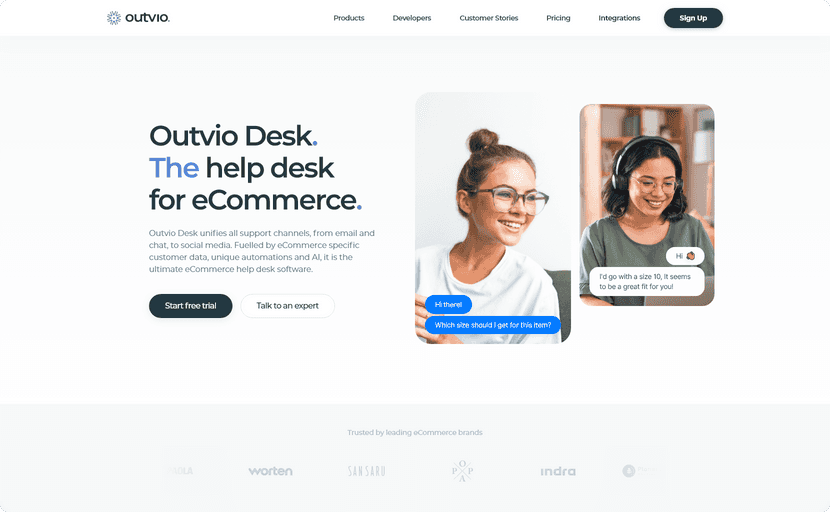
- Specialization: Complete automation of support and post-purchase
- Integrations for eCommerce: Over 30 sales channels and 100 carriers
- G2: 4.8
Outvio Desk is the only customer service software that connects your orders, support channels, and carriers in one tool. It automates everything, from the first visit to your site to delivery and returns, across all channels and fully adapted to you.
The platform lets you create different flows with smart rules, automate customer service and incident management, integrate an AI chatbot, and sync customer data to make your agents' work easier.
Key features
- Fully integrated customer service software
- Synchronizes order flow with support channels and carriers
- End-to-end automation from website visit to order transport and returns
- Omnichannel, efficient, and customizable
- Ticketing system with allocation rules
- Integrable chat for real-time support
- Return and tracking portals for customer convenience
- Automated notifications across all channels
- AI-driven personalization algorithms
Pricing: from $4,500/year (help desk module included with unlimited tickets, agents, automations, and voice calls).
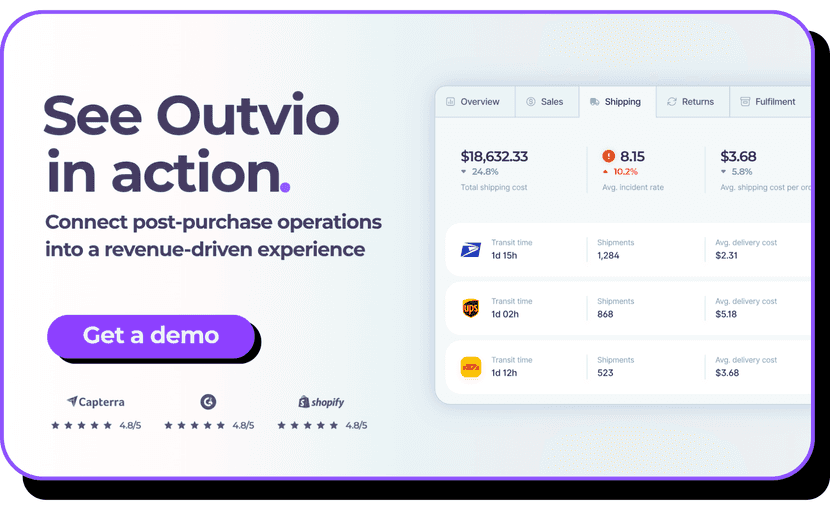
2. Minami AI
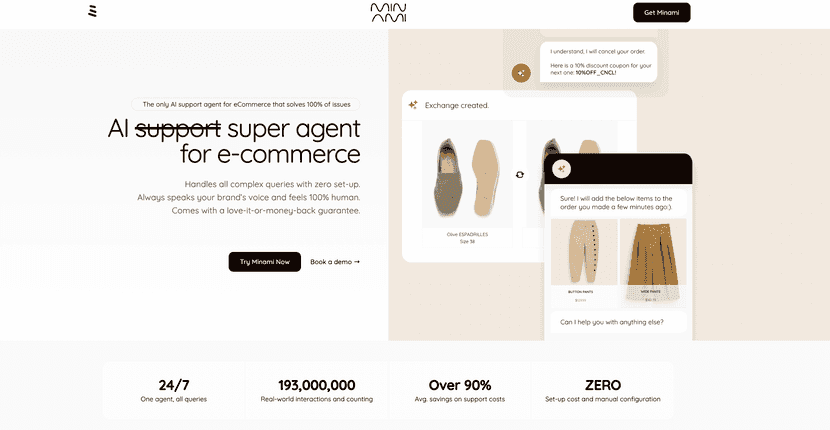
- Specialization: AI Agent for eCommerce
- Integrations for eCommerce: the Most Important CMS in eCommerce
- G2 Rating: 5
Minami is an AI agent for eCommerce that automates your entire customer service operation. Customers can chat through an embedded widget on your store. It not only provides automated answers; it also takes real actions in your store: processing exchanges and returns, updating orders, resolving issues, etc.
Powered by generative AI, it understands context at a human level, supports customers in chat, guides purchases with recommendations, and reduces the need to hire additional agents.
Key features
- Once integrated, you can forget about customer support problems in your store forever
- Do the work of 10 agents from one chat: resolve, update orders, reroute shipments, etc
- Turn refund requests into exchanges or store credit in the same thread
- End “Where is my order?” with live status and proactive alerts before customers ask
- Speak any language and stay on brand
- Work while you sleep: handle nights and weekends with the same quality
- Upsell and cross-sell in support to lift AOV with no extra friction
Pricing: Custom
3. Canary
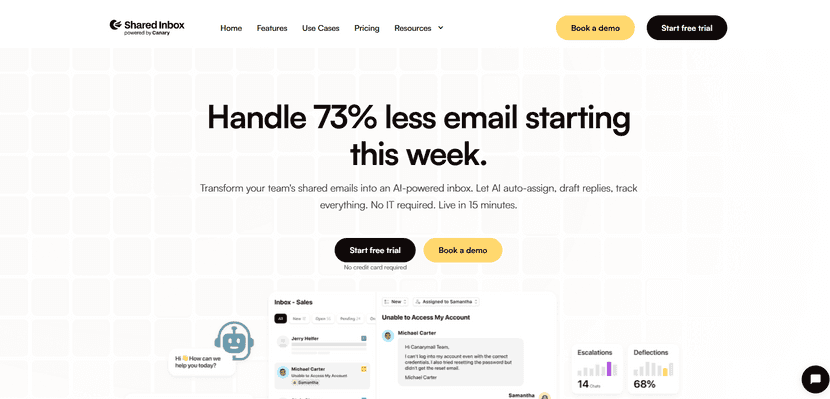
Specialization: Shared inbox + AI helpdesk Integrations for eCommerce: No native eCommerce integrations G2: 5.0
Shared Inbox by Canary is a modern support solution designed to simplify team collaboration around email-based customer queries. Built with productivity and clarity in mind, it helps teams assign, track, and resolve customer conversations efficiently — while AI auto-suggests replies and handles FAQs instantly. It's an ideal fit for companies that want to maintain a human touch while embracing automation.
Key features
- Shared inbox with clear ownership and assignments
- AI-powered reply suggestions to speed up response time
- Collision detection to avoid duplicate replies
- Templates for common replies
- Internal notes and @mentions for seamless team communication
- Built-in analytics to track individual and team performance
- Automatically deflects FAQs with AI chatbot
- Works with Gmail, Outlook, and custom domains
Pricing: Starter $10/user/month, Business $20/user/month, and Enterprise $30/user/month.
4. Hiver
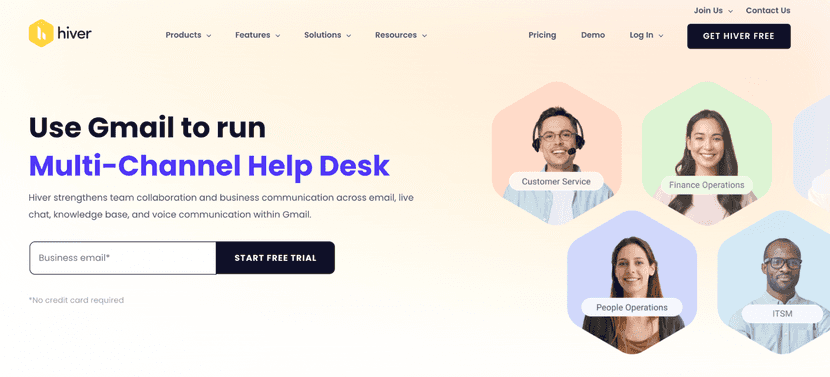
- Specialization: Shared inbox
- Integrations for eCommerce: No native eCommerce integrations
- G2: 4.6
Hiver is a customer service solution focused on Gmail. It can be used in eCommerce to optimize this contact channel, share accounts, automate responses, or monitor conversations. It is quite an interesting option if you are only going to use this contact channel.
Key features
- Shared inbox management
- Email delegation to team members
- Collision detection to prevent duplicate replies
- Internal notes and @mentions for team collaboration
- Email templates for quick, consistent responses
Pricing: Lite $24/agent/month, Pro $34/agent/month, and Elite $59/agent/month.
5. Freshdesk
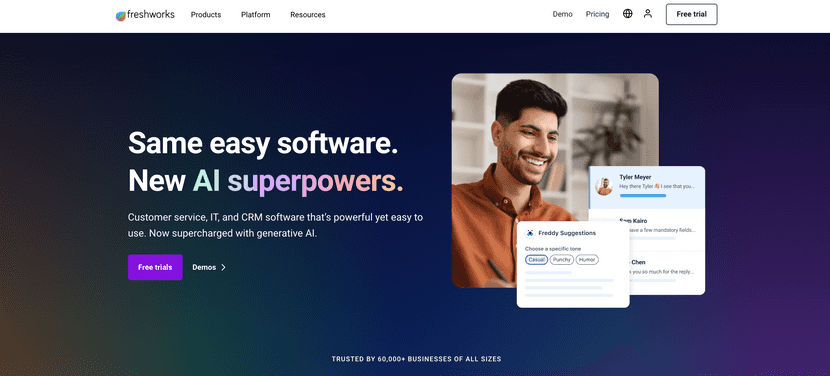
- Specialization: Ticketing system
- Integrations for eCommerce: Limited to 4 sales channels
- G2: 4.4
Freshsdesk is a cloud-based help desk software developed by the company Freshworks. It offers tools for organizing help services in enterprises and companies, typically in the B2B sector. Its ticketing and automation tools can also be used in the e-commerce environment to reduce response times and improve incident management.
Key features
- Ticket management for multi-channel inquiries
- Automation of repetitive tasks
- Multichannel support (email, phone, chat, social media, WhatsApp)
- Self-service portal with knowledge base and forums
- Collaboration tools for shared ticket ownership and notes
Pricing: Growth $18/agent/month, Pro $59/agent/month, Copilot $94/agent/month, and Enterprise $95/agent/month
6. Zoho Desk
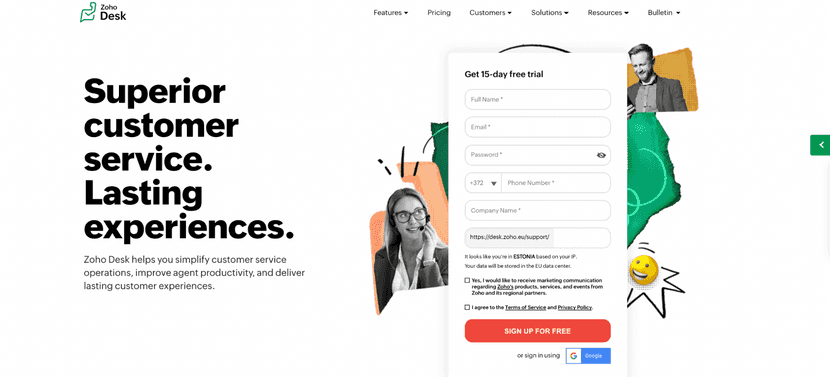
- Specialization: Phone calls service
- Integrations for eCommerce: No native eCommerce integrations
- G2: 4.4
Zoho Desk is a multichannel customer service platform ideal for eCommerce. It allows you to centralize communication through channels such as email or SMS, making it easier to send messages more efficiently.
Key features
- Omnichannel support (email, phone, chat, social media, web forms)
- Self-service portal with knowledge base and community forums
- Automation for task assignments and workflows
- Customization of modules, fields, and workflows
- Integration with Zoho applications and third-party tools
Pricing: Express $9/agent/month, Standard $20/agent/month, Professional $35/agent/month, and Enterprise $50/agent/month.
7. Gorgias
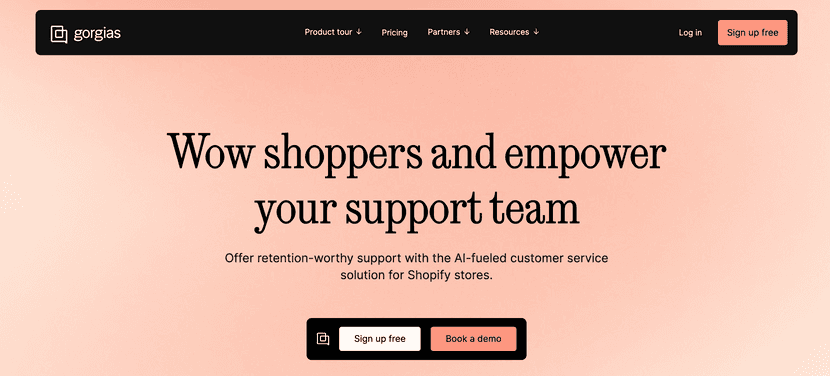
- Specialization: Customer support software for eCommerce
- Integrations for eCommerce: Limited 5 sales channels
- Score: 4.6
Gorgias is a customer service software with integration with Shopify eCommerce platforms. You will be able to integrate a chat into your store to communicate with customers, import tickets from different social networks, or automate answers to the most common questions.
Main features
- Customer support ticket management
- Multi-channel communication (email, social media, live chat)
- Automated responses and macros
- Customizable dashboards and analytics
- SLA management and priority setting
Pricing: Pricing: Basic $174/month (includes 300 tickets, extra $0.40/ticket), Pro $1,000/month (includes 2,000 tickets, extra $36 per 100 tickets), and Advanced $2,025/month (includes 5,000 tickets, extra $36 per 100 tickets).
8. Zendesk
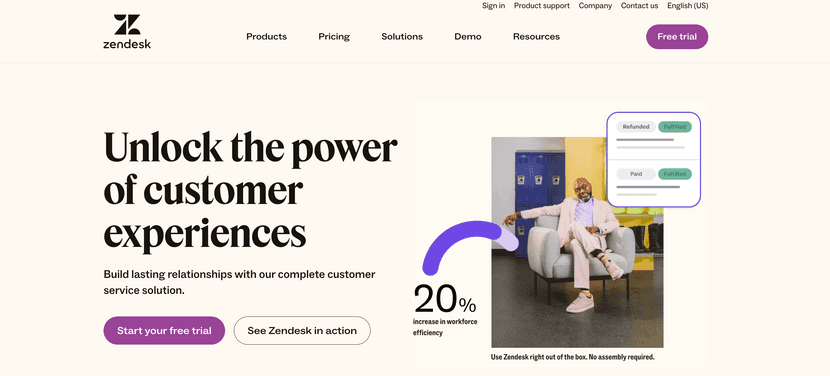
- Specialization: Support service for B2B eCommerce
- Integrations for eCommerce: Limited to 4 sales channels
- G2: 4.3
Zendesk is a sales and customer service software with several integrable modules. Although it is not specifically designed for eCommerce, it does have some interesting functionalities, such as chats or ticket automation.
Key features
- Centralized ticketing system
- Multi-channel support (email, chat, phone, social media)
- Self-service portal with knowledge base and forums
- Automation for ticket routing and workflows
- Analytics and reporting dashboards
- Customization and third-party integrations
Pricing (customer service module): Suite from $69/agent/month, Growth from $115/agent/month, and Professional from $145/agent/month.
9. Live Agent
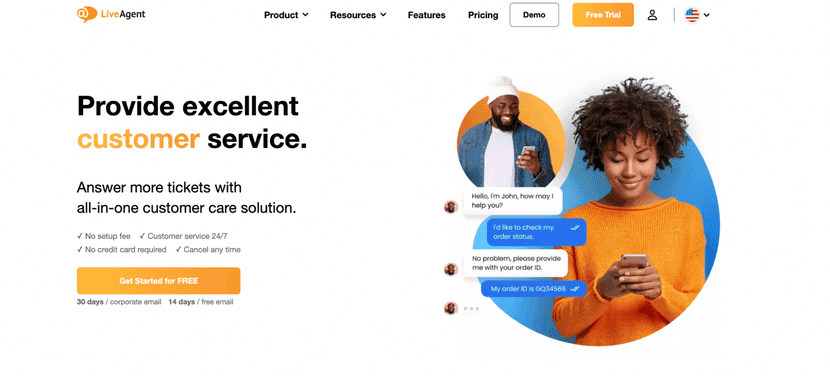
- Specialization: Chat for eCommerce
- Integrations for eCommerce: up to 17 sales channels
- G2: 4.5
LiveAgent is an omnichannel communication platform. If you have an eCommerce business, you can use it to automate messages or centralize conversations in a single interface. It also allows you to create a knowledge base to assist both internal workers and customers themselves. It has integration with Shopify and Prestashop. However, it does not have integration with carriers.
Key feature
- Centralized ticketing system
- Real-time live chat with proactive invitations
- Integrated call center with IVR and callback options
- Social media support (Facebook, Twitter, Instagram, Viber)
- Internal and external knowledge base creation
Pricing: Small $15/agent/month, Medium $29/agent/month, Large $49/agent/month, and Enterprise $69/agent/month.
10. eDesk
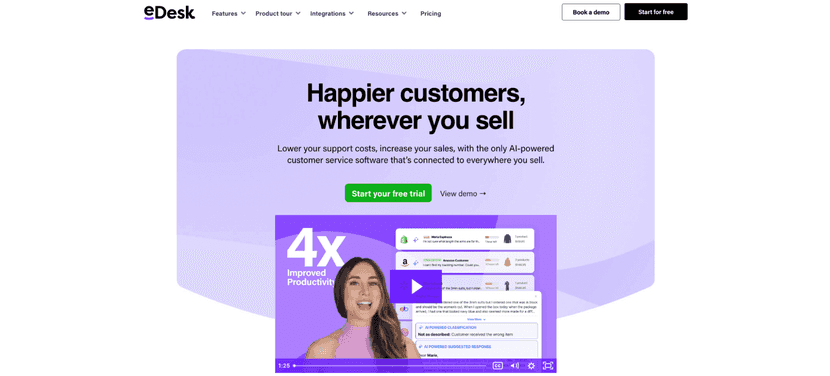
- Specialization: Ticketing linked directly to marketplace orders
- Integrations for eCommerce: limited to 11 sales channels
- G2: 3.9
eDesk connects customer support tickets with orders from marketplaces like Amazon, eBay, and Walmart. It centralizes messages across email, chat, and social channels. eDesk also offers AI tools to speed up responses and create template.
Key features
- Direct integrations with Amazon, eBay, Shopify, and more
- Centralized inbox for multi-channel communication
- AI-powered suggested replies and templates
- Reporting and customer satisfaction tracking
Pricing: Essential $49/agent/month, Growth $115/agent/month, and Professional $149/agent/month.
11. HappyFox
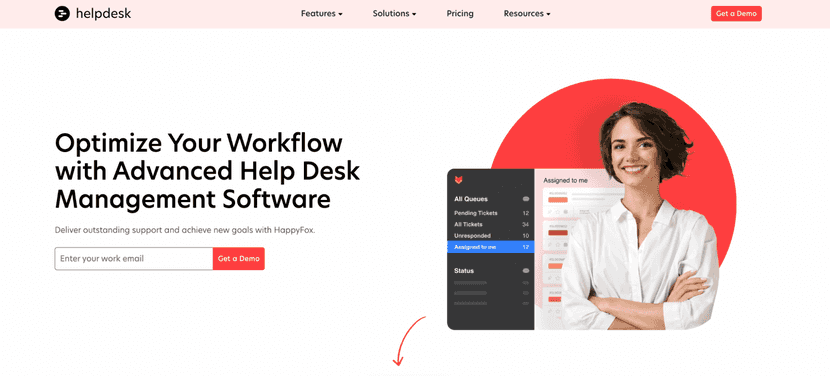
- Specialization: Customizable knowledge bases
- Integrations for eCommerce: Limited to 3 sales channels
- G2: 4.5
HappyFox is a help desk platform designed to handle tickets from multiple sources. You can manage emails, chats, social media messages, and even phone support from one place. It includes automation features for workflows and a self-service portal.
Key features
- Ticket management from email, chat, social, and voice
- Automation for ticket routing and responses
- Customizable customer self-service portals
- Knowledge base management tools
Pricing: Basic $29/agent/month, Team $69/agent/month, and Pro $119/agent/month.
12. Help Scout
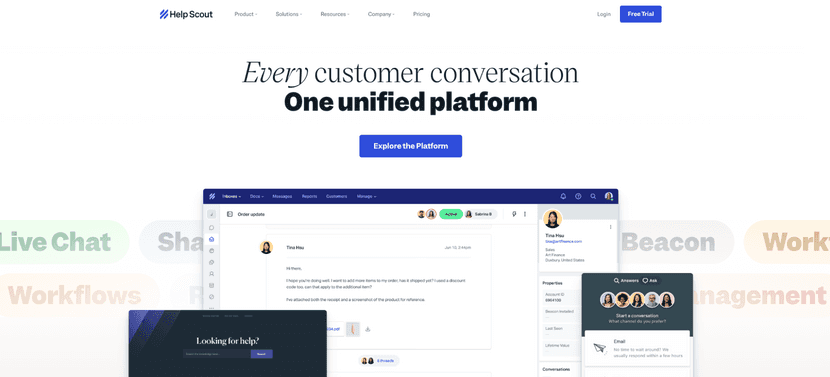
- Specialization: Live chat
- Integrations for eCommerce: Limited to 7 sales channels
- G2: 4.4
Help Scout focuses on making email support more personal and efficient. It offers a shared inbox, live chat, and a help center in one platform. It integrates with eCommerce platforms like Shopify.
Key features
- Shared inbox for team collaboration
- Beacon live chat widget with knowledge base integration
- Customizable help center
- Reporting and customer satisfaction surveys
Pricing: Standard $55/month (up to 100 contacts) and Plus $83/month (up to 100 contacts).
Traditional customer service software vs eCommerce specialized: What's the difference?
A truly specialized eCommerce customer service software should ensure seamless communication with carriers.
While many solutions have integration with CMSs like Shopify or WooCommerce, API integrations with carriers are vital for efficiency.
The rise of eCommerce has brought with it a flood of solutions that promise to seamlessly integrate with platforms like Shopify or WooCommerce. The reason is simple: lacking direct integration with shipping companies, they are unable to effectively manage returns and order processing. This makes customer service optimization incomplete and unable to meet the needs of online shoppers.
Some key functionalities of customer service software include the incorporation of tracking or returns portals into workflows and the ability to communicate with carriers whenever there are any issues or delays in deliveries.
Recomended to read
Discover the intricacies of customer service in eCommerce through our comprehensive guide. Uncover industry challenges and strategies to enhance online store retention.
Best practices for specialized eCommerce customer service solution
For specialized eCommerce customer service software, following best practices can enhance efficiency and improve customer satisfaction. Here’s an in-depth look at each practice:
1. Integrate chat into tracking and return portals
A high volume of customer inquiries occurs during the post-purchase phase, especially with order tracking and returns.
Integrating real-time chat within these portals (using platforms like Outvio) allows customers to receive immediate support without needing to navigate away or switch to another communication channel.
This integration reduces frustration, keeps customers engaged, and minimizes delays in handling concerns about order status, delivery times, or returns, which is essential for a positive shopping experience
2. Synchronize order and purchase information with support agents
Customer service software should provide agents with instant access to key order details—like delivery address, product information, and carrier data. When agents can view this information in real-time, they are empowered to make precise updates such as address changes or order modifications, enabling a responsive and customized support experience.
Real-time data also reduces dependency on back-and-forth communication, which shortens the resolution time for customers.
3. Send proactive notifications
Automated order updates reduce the need for customers to check in for status updates, keeping them informed at each stage of the purchase process.
By sending timely notifications, customer service can cut down on the volume of inquiries related to order status. This proactive approach not only manages customer expectations but also alleviates the pressure on support teams, as fewer repetitive inquiries reach them.
4. Create teams of agents and assign incoming tickets
Segmenting customer service teams by expertise (such as logistics, returns, or marketing) allows for quick and accurate ticket handling.
Using assignment rules to direct queries to the most appropriate team members (e.g., return requests to the returns team) ensures that issues are handled efficiently and by the right experts. This strategy also improves response quality and decreases handling time, making for a smoother experience for both agents and customers.
5. Automate the resolution of shipping incidents
Transport-integrated software solutions can automatically detect and resolve common shipping issues (like delays or misdeliveries) by monitoring carrier performance. Automating these tasks helps ensure that orders reach customers on time and minimizes the frequency of returns due to delivery mishaps.
6. Create automatic responses to frequently asked questions
Implementing automated response templates for common inquiries—such as tracking information or how to update an address—enables customer support to handle routine questions without agent intervention. Implementing a robust knowledge base using Document360 further enhances this process, reducing the agent workload.
Outvio, the best eCommerce customer service software
Outvio is built for eCommerce brands that want to deliver faster, smarter, and more personal support without extra effort. By connecting your orders, support channels, and carriers, it solves problems before they even reach you. Everything — questions, returns, deliveries, and updates — is managed in one place, fully automated and tailored to your brand.
"With Outvio, our customer service is faster, more personalized, and more effective. We reduced our customer support workload by 60%." — Ramón Montalbán, CTO
Discover why Outvio is the best customer service software for eCommerce. Book a demo.



